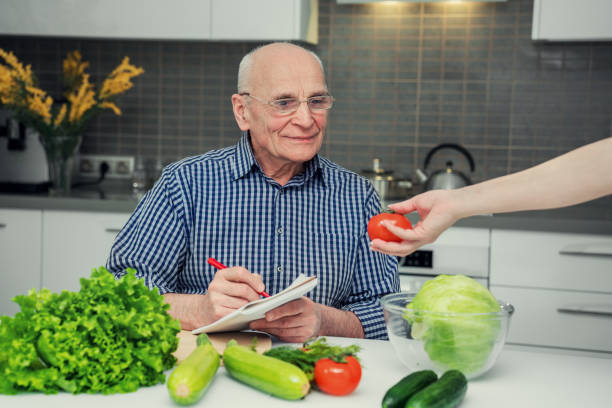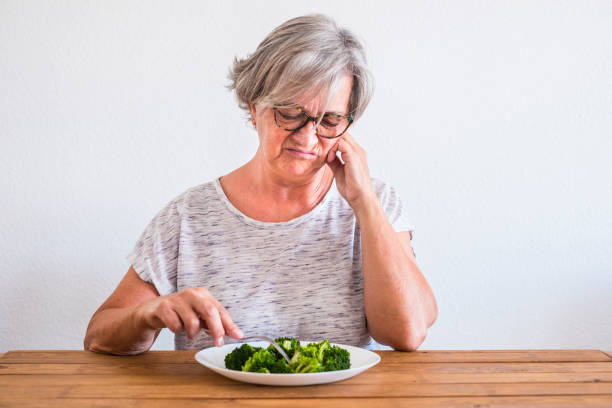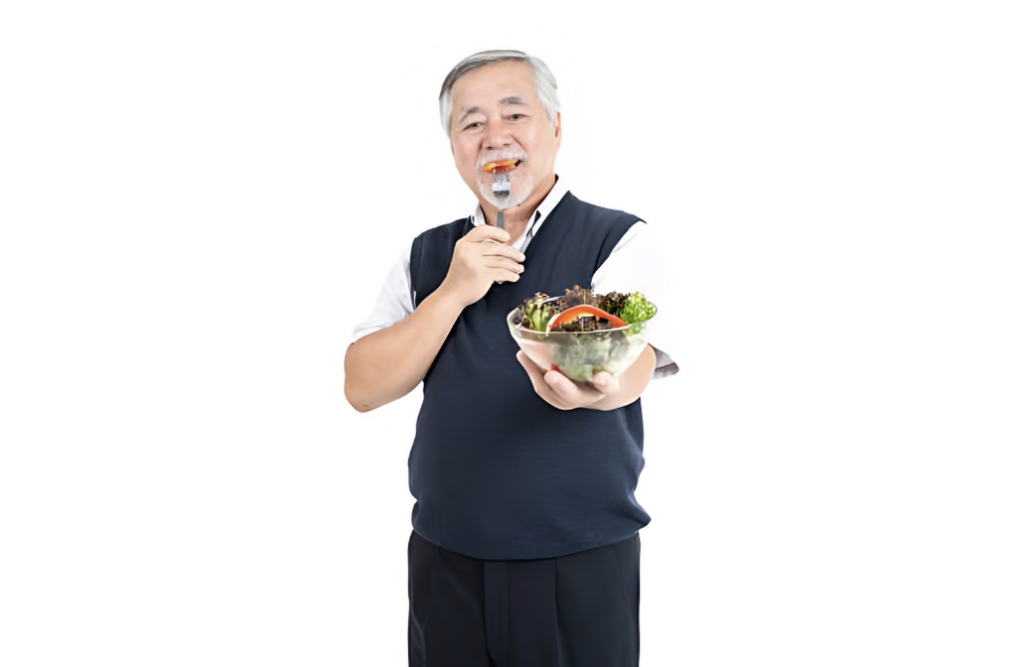Kinds of Diets
What is the Ideal Vegetarian Diet for the Elderly
As we get older, it’s more crucial to feed our bodies with nutritious foods. Many people find that following a vegetarian diet can help them maintain a healthy lifestyle. But what is the ideal vegetarian diet for the elderly? In this article, we will look at the different characteristics of a vegetarian diet that can be very good for seniors.
Importance of a Vegetarian Diet for the Elderly
One of the primary benefits of a vegetarian diet for the elderly is the abundance of nutrients it contains. Fruits, vegetables, whole grains, legumes, and plant-based proteins are high in vitamins, minerals, and antioxidants, all of which can help with general health and wellness. These meals are high in fiber, which assists digestion and helps avoid constipation, a significant problem among seniors. Furthermore, plant-based diets include significant levels of antioxidants, which can help guard against cellular damage and lower the risk of chronic diseases like cancer and Alzheimer’s.
A vegetarian diet can also help manage chronic illnesses linked to aging, such as heart disease, high blood pressure, and diabetes. Seniors can promote heart health and lower their chance of acquiring these problems by eating more plant-based meals and consuming less saturated fat and cholesterol. Plant-based diets have been demonstrated to lower blood pressure, improve blood sugar control, and reduce the risk of heart disease, all of which are essential for sustaining good health in old age.

Nutritional Needs of the Elderly
As we age, our nutritional needs change, and it is critical that we address these needs through our diet. Seniors often consume less calories, but their need for specific minerals, such as calcium, vitamin D, and vitamin B12, may increase.
Calcium and vitamin D are required to maintain strong bones and prevent osteoporosis, a disorder that grows increasingly common with age. Calcium-rich plant-based foods include tofu, leafy green vegetables, and fortified plant-based milk replacements. Vitamin D can be gained by sunlight or fortified foods. However, it is crucial to note that vitamin D deficiency is more common in seniors due to decreased sun exposure and a lower ability to produce vitamin D from sunshine. As a result, certain people may require supplemental nutrition.
Another component of importance for vegetarians is vitamin B12, which is found predominantly in animal products. Vitamin B12 deficiency can cause anemia, nerve damage, and cognitive deterioration. Seniors may have a diminished ability to absorb vitamin B12, necessitating supplementation or ingestion of fortified foods. Vegetarians can obtain vitamin B12 from fortified plant-based milk, morning cereals, and nutritional yeast.
Benefits of a Vegetarian Diet for the Elderly
A vegetarian diet has various benefits for the elderly. One of the primary benefits is a reduced risk of chronic diseases. Plant-based diets have been associated with a lower risk of heart disease, some malignancies, and type 2 diabetes. Seniors can minimize their saturated fat and cholesterol intake by avoiding or lowering their consumption of animal products, both of which are established risk factors for these illnesses.
Furthermore, a vegetarian diet might assist seniors stay at a healthy weight. As metabolism slows with age, it becomes simpler to gain weight. Plant-based diets are often lower in calories and higher in fiber, which can increase satiety and aid in weight management. Furthermore, the quantity of fruits and vegetables in a vegetarian diet provides important vitamins and minerals while keeping calorie intake under control.
A vegetarian diet for the elderly may also boost cognitive function. According to studies, a diet high in fruits, vegetables, whole grains, and healthy fats like nuts and seeds can help retain brain function and lower the risk of cognitive decline. This is especially crucial for elderly, as age-related cognitive loss and illnesses such as Alzheimer’s disease can significantly reduce quality of life.

Common Concerns about Vegetarian Diets for the Elderly
While a vegetarian diet can provide various benefits to the elderly, some typical issues must be addressed. One of the key problems is adequate protein consumption. Protein is necessary for maintaining muscle mass and strength, and it is especially vital for seniors to avoid age-related muscle loss. Plant-based sources of protein, such as beans, tofu, tempeh, and seitan, can readily cover most people’s protein requirements. To guarantee adequate intake, a vegetarian diet should contain a range of protein-rich foods.
Iron is another component that may require special care in a vegetarian diet for the elderly. Plant-based iron sources, such as leafy green vegetables, legumes, and fortified grains, can offer adequate iron when combined with vitamin C-rich meals to improve absorption. However, iron absorption from plant-based sources is less efficient than from animal sources, thus it is crucial to monitor iron intake and, if necessary, consider supplementing.
Key Nutrients to Include in a Vegetarian Diet for the Elderly
When adopting a vegetarian diet, it is critical to consume all vital nutrients in suitable amounts. Here are some important nutrients to focus on:
- Protein: Include a variety of plant-based protein sources such as legumes, tofu, tempeh, seitan, and plant-based protein powders.
- Calcium: Obtain calcium from sources such as tofu, leafy green vegetables, fortified plant-based milk alternatives, and calcium-fortified foods.
- Vitamin D: Seek sun exposure or consider supplementation if sun exposure is limited. Fortified plant-based milk alternatives and breakfast cereals can also be sources of vitamin D.
- Vitamin B12: Consume fortified plant-based milk, breakfast cereals, nutritional yeast, or consider taking a B12 supplement.
- Omega-3 fatty acids: Include plant-based sources of omega-3s, such as flaxseeds, chia seeds, walnuts, and algae-based supplements.
- Iron: Consume iron-rich foods like leafy green vegetables, legumes, fortified grains, and pair them with vitamin C-rich foods to enhance absorption.
- Fiber: Ensure an adequate intake of fiber by including whole grains, fruits, vegetables, legumes, and nuts and seeds in the diet.

Sample Meal Plan for a Vegetarian Diet for the Elderly
Here’s an example meal plan that shows how a vegetarian diet for the elderly can be structured:
Breakfast: oatmeal topped with berries, almonds, and seeds. – One glass of fortified plant-based milk.
Mid-Morning Snack: A slice of fruit and a handful of almonds
Lunch: A mixed green salad with chickpeas, cherry tomatoes, cucumber, and avocado. – Hummus with whole grain bread – Roasted vegetables on the side.
Afternoon snack: Carrot sticks with hummus.
Dinner: Tofu stir-fry with a variety of vegetables, served with brown rice. – Steamed broccoli served on the side.
Evening snack: Greek yogurt drizzled with honey and mixed berries.
Tips for Meal Planning and Preparation
Meal planning and preparation can be key to successfully following a vegetarian diet for the elderly. Here are some tips to help you get started:
- Plan your meals ahead of time: Set aside some time each week to plan your meals and make a shopping list to ensure you have all of the supplies on hand.
- Batch cook and freeze: Make larger batches of meals and freeze individual portions for later use. This might be especially helpful on days when cooking is more difficult.
- Experiment with flavors and cuisines: The vegetarian diet provides a diverse selection of flavors and cuisines to try. To make meals more fascinating and delightful, try different spices, herbs, and cooking techniques.
- Get ideas from vegetarian cookbooks and websites: There are various resources available that offer wonderful vegetarian recipes designed exclusively to elders. Use these resources to generate new and fascinating dinner ideas.
- Involve others: If you have a caregiver or support system, have them help you plan and prepare meals. This can make the process more fun while also ensuring that the elderly’s dietary demands are addressed.

Incorporating Variety into a Vegetarian Diet for the Elderly
Variety is key when following a vegetarian diet to ensure a wide range of nutrients are consumed. Here are some ways to incorporate variety into a vegetarian diet for the elderly:
- Include a rainbow of fruits and vegetables: Aim to consume fruits and vegetables of different colors to ensure a diverse array of vitamins, minerals, and antioxidants.
- Try new grains and legumes: Experiment with different whole grains and legumes, such as quinoa, farro, lentils, and black beans, to add variety to meals.
- Use herbs and spices: Enhance the flavors of your dishes by using a variety of herbs and spices. This can make meals more enjoyable and satisfying.
- Explore plant-based protein alternatives: Don’t be afraid to try new plant-based protein sources, such as tempeh, seitan, and plant-based protein powders, to diversify your protein intake.
- Incorporate fermented foods: Foods like sauerkraut, kimchi, and miso can provide beneficial probiotics and add tangy flavors to your meals.
Consulting with a Healthcare Professional for Personalized Advice
While this article contains useful information regarding the best vegetarian diet for the elderly, you should check with a healthcare expert for individualized dietary advice. They can examine your individual needs, take into account any underlying health conditions or drugs, and offer advice tailored to your specific situation. A licensed dietitian or nutritionist can assist you in developing a meal plan that will meet your nutritional requirements while also providing a balanced and pleasurable vegetarian diet.
Conclusion
Finally, adopting a vegetarian diet can provide several benefits to the elderly. A vegetarian diet can help seniors maintain good health and well-being by delivering a plethora of nutrients while also lowering their risk of chronic diseases. However, it is critical to focus on crucial nutrients such as protein, calcium, vitamin D, vitamin B12, and iron to ensure that all nutritional requirements are fulfilled.
Seniors can adopt a healthy vegetarian diet that promotes overall health and lifespan by combining variety, meal planning, and getting tailored counsel from healthcare professionals. So, why not delve into the lovely world of vegetarian cuisine and reap the benefits of a plant-based diet throughout your golden years?
Trusted Health, Wellness, and Medical advice for your well-being


